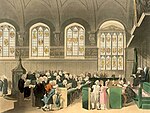
Back Estoppel AST Acte propi Catalan Estoppel German Doctrina de los actos propios Spanish استاپل Persian Estoppel French השתק HE Estoppel Italian 禁反言の法理 Japanese Эстоппель Kazakh
| Equitable doctrines |
|---|
 |
| Doctrines |
| Defences |
| Equitable remedies |
| Related |
Estoppel is a judicial device whereby a court may prevent or "estop" a person from making assertions or from going back on their word. The person barred from doing so is said to be "estopped".[1][2] Estoppel may prevent someone from bringing a particular claim. In common law legal systems, the legal doctrine of estoppel is based in both common law and equity.[3][4] Estoppel is also a concept in international law.[5]
- ^ Black, Henry Campbell; Garner, Bryan Andrew (2009). Black's law dictionary (9th ed.). St. Paul, Minn: West. p. 629. ISBN 9780314199492. (defining estoppel as "[a] bar that prevents one from asserting a claim or right that contradicts what one has said or done before."
- ^ "Estoppel". Wex. Cornell Law School. Retrieved 16 October 2021.
- ^ See Jorden v Money [1854] 10 ER 868
- ^ "Jorden, And Louisa, His Wife v Money: HL 30 Jul 1854". 23 July 2022. Retrieved 4 April 2023.
- ^ T. Cotter, H. P. Müller, "Estoppel" in Max Planck encyclopedia of Public International Law, April 2007.